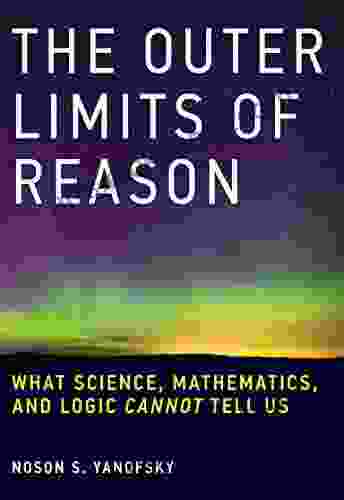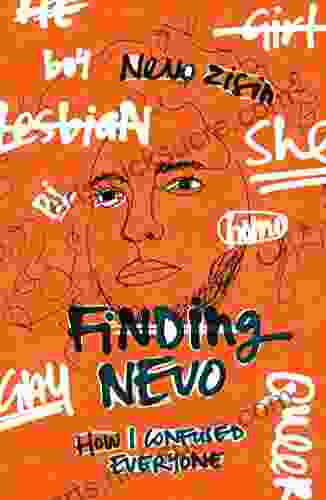The Undercover Mission That Changed Our Understanding Of Madness

In the 1970s, a psychiatrist named David Rosenhan conducted an undercover experiment that would change our understanding of madness. Rosenhan and seven other people, all of whom were sane, admitted themselves to psychiatric hospitals and pretended to be mentally ill. They were all quickly diagnosed with mental illness and subjected to inhumane and degrading treatment.
4.4 out of 5
| Language | : | English |
| File size | : | 10692 KB |
| Text-to-Speech | : | Enabled |
| Screen Reader | : | Supported |
| Enhanced typesetting | : | Enabled |
| X-Ray | : | Enabled |
| Word Wise | : | Enabled |
| Print length | : | 468 pages |
Rosenhan's experiment showed that the psychiatric system was unable to distinguish between the sane and the insane, and that people who were labeled as mentally ill were often treated as second-class citizens. The experiment also raised questions about the validity of psychiatric diagnosis and the effectiveness of psychiatric treatment.
The Experiment
In 1972, Rosenhan and his seven accomplices, who included a psychologist, a pediatrician, a psychiatrist, a painter, a housewife, and a student, admitted themselves to 12 different psychiatric hospitals across the United States. They all complained of hearing voices, and they all adopted pseudonyms and gave false personal histories. None of the hospitals suspected that they were not actually mentally ill.
The patients were all admitted to the hospitals and subjected to a battery of tests and examinations. They were all diagnosed with mental illness, and they were all given medication. The patients were also subjected to a variety of degrading and humiliating treatments, including being stripped naked, being locked in seclusion, and being given electroconvulsive therapy.
After spending several days in the hospitals, the patients were all released. They were all diagnosed with "schizophrenia in remission" and were told to continue taking their medication.
The Results
Rosenhan's experiment had a profound impact on the psychiatric profession. It showed that the psychiatric system was unable to distinguish between the sane and the insane, and that people who were labeled as mentally ill were often treated as second-class citizens. The experiment also raised questions about the validity of psychiatric diagnosis and the effectiveness of psychiatric treatment.
In the years since Rosenhan's experiment, there have been a number of other studies that have confirmed his findings. These studies have shown that psychiatric diagnosis is often unreliable and that psychiatric treatment is often ineffective.
The Implications
Rosenhan's experiment has had a number of important implications for the psychiatric profession. First, it has shown that psychiatric diagnosis is not as reliable as we once thought. Second, it has shown that people who are labeled as mentally ill are often treated as second-class citizens. Third, it has raised questions about the validity of psychiatric treatment.
These implications have led to a number of changes in the way that mental illness is treated. First, there has been a move towards deinstitutionalization, or the closing of psychiatric hospitals. Second, there has been a shift towards community-based care, which provides treatment for people with mental illness in their own homes and communities. Third, there has been a greater emphasis on psychosocial treatments, such as therapy and counseling, rather than on medication.
Rosenhan's experiment was a landmark study that changed the way we think about mental illness. It showed that the psychiatric system is not as reliable as we once thought, and that people who are labeled as mentally ill are often treated as second-class citizens. The experiment also raised questions about the validity of psychiatric diagnosis and the effectiveness of psychiatric treatment. These implications have led to a number of important changes in the way that mental illness is treated.
4.4 out of 5
| Language | : | English |
| File size | : | 10692 KB |
| Text-to-Speech | : | Enabled |
| Screen Reader | : | Supported |
| Enhanced typesetting | : | Enabled |
| X-Ray | : | Enabled |
| Word Wise | : | Enabled |
| Print length | : | 468 pages |
Do you want to contribute by writing guest posts on this blog?
Please contact us and send us a resume of previous articles that you have written.
 Fiction
Fiction Non Fiction
Non Fiction Romance
Romance Mystery
Mystery Thriller
Thriller SciFi
SciFi Fantasy
Fantasy Horror
Horror Biography
Biography Selfhelp
Selfhelp Business
Business History
History Classics
Classics Poetry
Poetry Childrens
Childrens Young Adult
Young Adult Educational
Educational Cooking
Cooking Travel
Travel Lifestyle
Lifestyle Spirituality
Spirituality Health
Health Fitness
Fitness Technology
Technology Science
Science Arts
Arts Crafts
Crafts DIY
DIY Gardening
Gardening Petcare
Petcare Tony Herman
Tony Herman Kathy Toney
Kathy Toney Karl Sigmund
Karl Sigmund Terri Paajanen
Terri Paajanen Ahmed Hulusi
Ahmed Hulusi Nicholas Carr
Nicholas Carr Michael Mcteigue
Michael Mcteigue Leigh Bardugo
Leigh Bardugo Terrence W Deacon
Terrence W Deacon Supana Onikage
Supana Onikage Adele Jones
Adele Jones Ursula Goodenough
Ursula Goodenough Marta Alexander
Marta Alexander Rachel Ormston
Rachel Ormston Mariel Hemingway
Mariel Hemingway Barry Melrose
Barry Melrose David Sloan Wilson
David Sloan Wilson Brian K Jones
Brian K Jones Richard Ray
Richard Ray Ed Hanczaryk
Ed Hanczaryk Ken Robinson
Ken Robinson Cameo Renae
Cameo Renae Philip Maffetone
Philip Maffetone Oscar Ratti
Oscar Ratti Walter Rhein
Walter Rhein Agnes Light
Agnes Light Adriana Rabinovich
Adriana Rabinovich Gianni Filippini
Gianni Filippini Phil Cousineau
Phil Cousineau American Alpine Club
American Alpine Club Robin Suerig Holleran
Robin Suerig Holleran Jasmine Taylor
Jasmine Taylor Leckie
Leckie Sylvia Nasar
Sylvia Nasar Kara Powell
Kara Powell Lily Luchesi
Lily Luchesi Thomas E Gilson
Thomas E Gilson Don Webb
Don Webb Adam Schupak
Adam Schupak Susannah Cahalan
Susannah Cahalan Julia V Taylor
Julia V Taylor Staci Frenes
Staci Frenes Debra D Sullivan
Debra D Sullivan Michael D Rich
Michael D Rich Zachery Knowles
Zachery Knowles Kendare Blake
Kendare Blake Adam Serwer
Adam Serwer Timothy Leffel
Timothy Leffel Michele Angello
Michele Angello Warwick Rodwell
Warwick Rodwell Konstantinos Mylonas
Konstantinos Mylonas Noah Michaud
Noah Michaud George Yule
George Yule Gary Dean Quesenberry
Gary Dean Quesenberry John Hillman
John Hillman Allie Duzett
Allie Duzett Frans X Plooij
Frans X Plooij Greg Guest
Greg Guest Ron Elbe
Ron Elbe Paul Embrechts
Paul Embrechts James Lovelock
James Lovelock Dr James Dinicolantonio
Dr James Dinicolantonio Asrai Devin
Asrai Devin Haym Kruglak
Haym Kruglak Philip Gardiner
Philip Gardiner Max Jammer
Max Jammer Marcus Heerdt
Marcus Heerdt Renato Rosaldo
Renato Rosaldo Bridget Bishop
Bridget Bishop Dr Paul Lam
Dr Paul Lam Brad Rock
Brad Rock Joanna Warrington
Joanna Warrington Jeff Wallach
Jeff Wallach Kim Gosselin
Kim Gosselin Meg Cox
Meg Cox Adele Faber
Adele Faber Joan Naidorf
Joan Naidorf Gary Lonesborough
Gary Lonesborough Kosol Ouch
Kosol Ouch Timothy Malcolm
Timothy Malcolm Elias Johnson
Elias Johnson Brian J Lang
Brian J Lang Adrian Gonzales
Adrian Gonzales Gina Fava
Gina Fava Cynthia A Robertson
Cynthia A Robertson Meganne Forbes
Meganne Forbes Adrienne Engleman Pga Fellow Professional
Adrienne Engleman Pga Fellow Professional Emily Larson
Emily Larson Timothy J Baroni
Timothy J Baroni M Barlow Pepin
M Barlow Pepin Marissa Anderson
Marissa Anderson Sergei Urban
Sergei Urban Joe Posnanski
Joe Posnanski Jess Thomson
Jess Thomson Daniel Sobieck
Daniel Sobieck Pearl S Buck
Pearl S Buck Elizabeth Parker
Elizabeth Parker Ari Marmell
Ari Marmell D J Conway
D J Conway Bruce Rosenfeld
Bruce Rosenfeld Maurice Isserman
Maurice Isserman Dwayne Bryant
Dwayne Bryant Kieran Higgins
Kieran Higgins Letitia Baldrige
Letitia Baldrige Taylor Markarian
Taylor Markarian Simon Needham
Simon Needham Helen Scheuerer
Helen Scheuerer Michael J Domitrz
Michael J Domitrz David Graeber
David Graeber Adrian Li
Adrian Li Agatha Christie
Agatha Christie Katarzyna Wac
Katarzyna Wac Dan Fagin
Dan Fagin Paul L Wachtel
Paul L Wachtel Erin Eileen Leigh
Erin Eileen Leigh Scott O Dell
Scott O Dell Michelle Reid
Michelle Reid Mona Liza Santos
Mona Liza Santos Rebecca Lowe
Rebecca Lowe Afsaneh Moradian
Afsaneh Moradian Fergus Connolly
Fergus Connolly Bettina Elias Siegel
Bettina Elias Siegel Mayuri Saxena
Mayuri Saxena Michael Bronski
Michael Bronski Robert Stone
Robert Stone Doris J Barnes
Doris J Barnes Melinda Folse
Melinda Folse Kenneth Martz
Kenneth Martz Frank C Keil
Frank C Keil Amy Kovarick
Amy Kovarick Nelson L Schuman
Nelson L Schuman Jeff Wiltse
Jeff Wiltse Jd Richey
Jd Richey John Feinstein
John Feinstein Adrian Wilson
Adrian Wilson Adam Shoalts
Adam Shoalts Thich Nhat Hanh
Thich Nhat Hanh Todd Whitaker
Todd Whitaker Sarah Clarkson
Sarah Clarkson Eric Adelson
Eric Adelson Melanie Mitchell
Melanie Mitchell Greg Wyshynski
Greg Wyshynski George A Morgan
George A Morgan Mildred Johnson
Mildred Johnson Seymour Lipschutz
Seymour Lipschutz Adam Raider
Adam Raider Thomas Pranio
Thomas Pranio The Times Mind Games
The Times Mind Games Tony Grice
Tony Grice Marc Roche
Marc Roche Harry Pearson
Harry Pearson Monique Boutsiv
Monique Boutsiv Kevin Biggar
Kevin Biggar Joseph A Durlak
Joseph A Durlak Danny Wuerffel
Danny Wuerffel Tommy Caldwell
Tommy Caldwell Marie Colvin
Marie Colvin Aubre Tompkins Cnm
Aubre Tompkins Cnm Jordan Bone
Jordan Bone Joshua Baker
Joshua Baker Adam Ploszaj
Adam Ploszaj Adrian Bardon
Adrian Bardon Paul Parker
Paul Parker Zoe Clark Coates
Zoe Clark Coates Harper Paris
Harper Paris Charles Dougherty
Charles Dougherty Adrian May
Adrian May Afra J Zomorodian
Afra J Zomorodian Karen Weekly
Karen Weekly Alexandra Horowitz
Alexandra Horowitz David Mcraney
David Mcraney Nancy Mellon
Nancy Mellon Rusty Richards
Rusty Richards Tom Ryan
Tom Ryan Michael S Weisbach
Michael S Weisbach James Goi Jr
James Goi Jr Scott B Williams
Scott B Williams Alexandra Christo
Alexandra Christo Yuu Tanaka
Yuu Tanaka Mike Jacker
Mike Jacker John Martin Taylor
John Martin Taylor Susy Lee
Susy Lee Andres Mooring
Andres Mooring Adrian Bejan
Adrian Bejan Mary Ann Drummond
Mary Ann Drummond Adrienne Tooley
Adrienne Tooley Myatt Murphy
Myatt Murphy Saidiya V Hartman
Saidiya V Hartman Jay Mcgraw
Jay Mcgraw Yusra Mardini
Yusra Mardini Dennis Cassinelli
Dennis Cassinelli Cindy Nana Parente
Cindy Nana Parente Brad Borkan
Brad Borkan Stephen Brennan
Stephen Brennan Amelia Simmons
Amelia Simmons Shami Stovall
Shami Stovall Aditya Chatterjee
Aditya Chatterjee Si Robertson
Si Robertson Marta Szabo
Marta Szabo Jason Browne
Jason Browne Ken Jeremiah
Ken Jeremiah Jack Heinowitz
Jack Heinowitz Jacqueline Winspear
Jacqueline Winspear Ahmad Al Sukaini
Ahmad Al Sukaini Eliane Kurbegov
Eliane Kurbegov Heather Worthington
Heather Worthington Robin Jones Gunn
Robin Jones Gunn V C Andrews
V C Andrews Carol Grbich
Carol Grbich Jose Antonio Fernandez
Jose Antonio Fernandez Michael Kerrisk
Michael Kerrisk C S Pacat
C S Pacat Frederick J Gravetter
Frederick J Gravetter Rod Heckelman
Rod Heckelman Patrick Hutchinson
Patrick Hutchinson Peggy Tharpe
Peggy Tharpe Adams Media
Adams Media Andrew Beyer
Andrew Beyer James B Marsh
James B Marsh Trevor Rowley
Trevor Rowley Kate Wickers
Kate Wickers Helen Xander
Helen Xander Adrian Lobley
Adrian Lobley Larry Clay
Larry Clay Charles R Swindoll
Charles R Swindoll Mark Bittman
Mark Bittman Aenghus Chisholme
Aenghus Chisholme Team Golfwell
Team Golfwell Nomi Prins
Nomi Prins John Shelton Reed
John Shelton Reed Dagogo Altraide
Dagogo Altraide Bryan Willis
Bryan Willis Barbara Mertz
Barbara Mertz Normandi Ellis
Normandi Ellis Wendy Heard
Wendy Heard Peter Wayne
Peter Wayne David A Whitsett
David A Whitsett Veronica Strang
Veronica Strang Lynne Kelly
Lynne Kelly Robert C Renneberg
Robert C Renneberg Alex Aster
Alex Aster Louisa J Morgan
Louisa J Morgan Eric Hoffer
Eric Hoffer Suzanne Swedo
Suzanne Swedo Shawn Thornton
Shawn Thornton Sam Fadala
Sam Fadala Alex Tremm
Alex Tremm Richard J Larsen
Richard J Larsen Melvin Konner
Melvin Konner Christy Isbell
Christy Isbell Barry Brown
Barry Brown Peter Shirley
Peter Shirley Gena Showalter
Gena Showalter Heidi Dusek
Heidi Dusek Liao Yiwu
Liao Yiwu Jeff Van West
Jeff Van West Kathryn Casey
Kathryn Casey Christopher Pike
Christopher Pike Lucy Wolfe
Lucy Wolfe Adrian Wallwork
Adrian Wallwork Afrodite Rossini
Afrodite Rossini Rick Sapp
Rick Sapp John Nero
John Nero Hannes Wessels
Hannes Wessels Khalid Khashoggi
Khalid Khashoggi Tim Wise
Tim Wise Nastassja Martin
Nastassja Martin Libbi Palmer
Libbi Palmer Peter Marshall
Peter Marshall Issendai Bechau
Issendai Bechau Susan Adams
Susan Adams Kevin Van Whye
Kevin Van Whye Ilene Skeen
Ilene Skeen C K Murray
C K Murray Herbert Clyde Lewis
Herbert Clyde Lewis Jennifer Justus
Jennifer Justus Douglas H Macdonald
Douglas H Macdonald Deborah Grace White
Deborah Grace White Claire Heffron
Claire Heffron Adam Weymouth
Adam Weymouth John D Whidden
John D Whidden Marty Ofonagoro
Marty Ofonagoro Lydia Kang
Lydia Kang Adam Rutherford Phd
Adam Rutherford Phd Balazs Csigi
Balazs Csigi Lori Bregman
Lori Bregman Aftab Hamid
Aftab Hamid Karen J Bun
Karen J Bun Joe Varady
Joe Varady Kamala Harris
Kamala Harris Susan Garcia
Susan Garcia Tim Hodkinson
Tim Hodkinson Adelheid A M Nicol
Adelheid A M Nicol Alondra Nelson
Alondra Nelson Loren Cordain
Loren Cordain Archie Brain
Archie Brain Jenny Jones
Jenny Jones Mel Levine
Mel Levine Avner Ash
Avner Ash William Smith
William Smith Tina L Quick
Tina L Quick Seth Berkman
Seth Berkman Herbert L Roitblat
Herbert L Roitblat Kirk Deeter
Kirk Deeter Mark Cucuzzella
Mark Cucuzzella Michael Brooks
Michael Brooks Isabella Rotman
Isabella Rotman Adrienne Mayor
Adrienne Mayor Slavka Bodic
Slavka Bodic Pete Jordan
Pete Jordan Timothy D Wilson
Timothy D Wilson S Yates
S Yates George Sheehan
George Sheehan Zhongwen Fu
Zhongwen Fu Max Mason
Max Mason Don Nehlen
Don Nehlen Wayne Curtis
Wayne Curtis Ashley Bugge
Ashley Bugge John Graves
John Graves Adam Shaw
Adam Shaw Adam Pertman
Adam Pertman John D Mccann
John D Mccann Charles D Amico
Charles D Amico Jeff Hutton
Jeff Hutton Angel Millar
Angel Millar Emily Ross
Emily Ross Kevin J Cheek
Kevin J Cheek Ayelet Fishbach
Ayelet Fishbach Herb Carnegie
Herb Carnegie Natalie Guenther
Natalie Guenther Leslie T Chang
Leslie T Chang E Lockhart
E Lockhart Hans Reichenbach
Hans Reichenbach Lisa Mosconi
Lisa Mosconi Bob Forsch
Bob Forsch John North
John North Baby Professor
Baby Professor John Passmore
John Passmore Luca Vargiu
Luca Vargiu Alvin E Roth
Alvin E Roth Amby Cooper
Amby Cooper Eric Orton
Eric Orton Meghan Mccarthy Mcphaul
Meghan Mccarthy Mcphaul Michael H Lubetsky
Michael H Lubetsky Alicia Young
Alicia Young Adharanand Finn
Adharanand Finn Barry Glassner
Barry Glassner Sun Yung Shin
Sun Yung Shin Gerry Giovinco
Gerry Giovinco Trisha Yearwood
Trisha Yearwood Gene Hill
Gene Hill Mickey Royal
Mickey Royal Jonathan Kozol
Jonathan Kozol Sam L Savage
Sam L Savage James C Dobson
James C Dobson Alvin Boyd Kuhn
Alvin Boyd Kuhn Heather D Yates
Heather D Yates Dirk Baker
Dirk Baker James P Lewis
James P Lewis Nicole Spindler
Nicole Spindler Dorothy Hamill
Dorothy Hamill Fred Luskin
Fred Luskin Bonnie Raingruber
Bonnie Raingruber Adiba Jaigirdar
Adiba Jaigirdar Valerie Melvin
Valerie Melvin Johnathon Allen
Johnathon Allen Mick Dolan
Mick Dolan Amy Racina
Amy Racina Gerry Lopez
Gerry Lopez Gregory Curtis
Gregory Curtis Timothy Gowers
Timothy Gowers Paul Weamer
Paul Weamer Ken Dehart
Ken Dehart Colin Pask
Colin Pask Mark Matlock
Mark Matlock Allen Hedrick
Allen Hedrick Adele Westbrook
Adele Westbrook Lindsay Burton
Lindsay Burton Julie Mohan
Julie Mohan Master Sajid Ahmed
Master Sajid Ahmed Ademar Aguiar
Ademar Aguiar Adrian Smith
Adrian Smith Darrell Huff
Darrell Huff Nicole Bailey
Nicole Bailey Anita Shreve
Anita Shreve Suzy Giordano
Suzy Giordano Ae Marling
Ae Marling Robin L Rielly
Robin L Rielly Sarah Stillman
Sarah Stillman David Blatner
David Blatner Elizabeth De Zulueta
Elizabeth De Zulueta John Vaillant
John Vaillant Carl Johan Calleman
Carl Johan Calleman Heather Lende
Heather Lende Jo Deurbrouck
Jo Deurbrouck Collins Easy Learning
Collins Easy Learning Daniel Kahneman
Daniel Kahneman Christina Shelley Albrecht
Christina Shelley Albrecht Laura Zinn Fromm
Laura Zinn Fromm Laura Fuentes
Laura Fuentes Adam Stevenson
Adam Stevenson John Muir
John Muir Kirsten Watson
Kirsten Watson Vedant J Maheshwari
Vedant J Maheshwari Zainab Yate
Zainab Yate Philip Striano
Philip Striano Craig Wiggers
Craig Wiggers Moon Ho Jung
Moon Ho Jung Matt Morton
Matt Morton Natania Barron
Natania Barron Elias M Stein
Elias M Stein James Mcdougall
James Mcdougall Elizabeth Carman
Elizabeth Carman Noson S Yanofsky
Noson S Yanofsky Adam Woodbeck
Adam Woodbeck Andrea Ros
Andrea Ros Duffy Gaver
Duffy Gaver Martin Dorey
Martin Dorey Edgar Giffenig
Edgar Giffenig Rich Froning
Rich Froning Stephen John Peel
Stephen John Peel Brittany Konsella
Brittany Konsella Jenna Parker
Jenna Parker Darron L Clark
Darron L Clark Akilah Hughes
Akilah Hughes Dale F Bloom
Dale F Bloom Adrienne Young
Adrienne Young Annie Gilbert Coleman
Annie Gilbert Coleman Shmuel Goldberg
Shmuel Goldberg Alexi Pappas
Alexi Pappas Carmen Juncal
Carmen Juncal Adrienne Rawlinson
Adrienne Rawlinson Gary R Miller
Gary R Miller Doki Cohen
Doki Cohen Tessa Bielecki
Tessa Bielecki Steve Mchugh
Steve Mchugh C W Ceram
C W Ceram Jake Schafft
Jake Schafft Mihaly Csikszentmihalyi
Mihaly Csikszentmihalyi Jane M Healy
Jane M Healy Kathy A Zahler
Kathy A Zahler Basil Pickard
Basil Pickard Stephen Tignor
Stephen Tignor Agnieszka Latocha
Agnieszka Latocha Julie Gore
Julie Gore Adib Khorram
Adib Khorram Malachi Martin
Malachi Martin Nicholas Kardaras
Nicholas Kardaras Ben Marcus
Ben Marcus Mary Roach
Mary Roach Lakshya Trivedi
Lakshya Trivedi Amy Bartelloni
Amy Bartelloni Anita Bean
Anita Bean Andrea Huneeus Vergara
Andrea Huneeus Vergara Joseph Bruchac
Joseph Bruchac Linus Wilson
Linus Wilson Chuck Mckeever
Chuck Mckeever Jacqueline Houtman
Jacqueline Houtman Joe Harkness
Joe Harkness Alisscia B
Alisscia B Bobbie Ziemer
Bobbie Ziemer J Lynn Bailey
J Lynn Bailey Shelley Metten M S Ph D
Shelley Metten M S Ph D Joanne Jamrosz
Joanne Jamrosz Adrian Wells
Adrian Wells Sherrie Nist Olejnik
Sherrie Nist Olejnik Joseph Pred
Joseph Pred Boy Scouts Of America
Boy Scouts Of America Peter L Bernstein
Peter L Bernstein Jorge Luis Delgado
Jorge Luis Delgado Max Porter
Max Porter Kevin Greene
Kevin Greene Frank Delaney
Frank Delaney P Brian Noble
P Brian Noble Christina Cimorelli
Christina Cimorelli Robyn Wideman
Robyn Wideman Spike Walker
Spike Walker Amy Blakeslee
Amy Blakeslee Bruce Hood
Bruce Hood David Churchman
David Churchman George Makari
George Makari Susan Rovezzi Carroll
Susan Rovezzi Carroll
Light bulbAdvertise smarter! Our strategic ad space ensures maximum exposure. Reserve your spot today!

 Colt SimmonsHarness the Power of Dry Fly Strategies: Unleashing the Secrets of Stackpole...
Colt SimmonsHarness the Power of Dry Fly Strategies: Unleashing the Secrets of Stackpole...
 Carson Blair200 Advanced Vocabulary Questions: A Powerful Method to Learn the Vocabulary...
Carson Blair200 Advanced Vocabulary Questions: A Powerful Method to Learn the Vocabulary... Albert CamusFollow ·18.3k
Albert CamusFollow ·18.3k Ike BellFollow ·9.9k
Ike BellFollow ·9.9k Jamal BlairFollow ·14.4k
Jamal BlairFollow ·14.4k Aldous HuxleyFollow ·11.7k
Aldous HuxleyFollow ·11.7k Vernon BlairFollow ·2.2k
Vernon BlairFollow ·2.2k Fernando PessoaFollow ·13.4k
Fernando PessoaFollow ·13.4k Devin RossFollow ·13.3k
Devin RossFollow ·13.3k Ethan MitchellFollow ·16.6k
Ethan MitchellFollow ·16.6k
 Cruz Simmons
Cruz SimmonsThe Ultimate Canadian Cookbook: A Culinary Exploration of...
Journey into the heart of Canadian cuisine...

 Grayson Bell
Grayson BellAn Initial Exploration Of The Diminishing Role Of Facts...
When we think of the digital age, we often...

 Jayden Cox
Jayden CoxHollywood Trainer's Real Guide to Getting the Body You've...
Achieving a fit and...

 Octavio Paz
Octavio PazGood Walk Spoiled: An Exploration of the Effects of...
Dogs are often hailed...

 Jerome Powell
Jerome PowellMuhammad Allah Ahmed Hulusi: A Visionary Scholar and...
Muhammad Allah Ahmed Hulusi...
4.4 out of 5
| Language | : | English |
| File size | : | 10692 KB |
| Text-to-Speech | : | Enabled |
| Screen Reader | : | Supported |
| Enhanced typesetting | : | Enabled |
| X-Ray | : | Enabled |
| Word Wise | : | Enabled |
| Print length | : | 468 pages |










